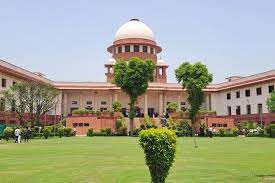The sword of Damocles hangs on the head of Yoga Guru Ramdev and his deputy Acharya Balkrishna in the contempt case in connection with the publication of advertisements making fictitious claims about medicines marketed by their company, Patanjali Ayurveda. A report by Mudit Mathur

The sword of being punished for deliberately committing contempt of the apex court continues to hang on the head of Yoga Guru Ramdev and his deputy Acharya Balkrishna in the contempt case in connection with the publication of misleading advertisements making fictitious claims about medicines marketed by their company, ‘Patanjali Ayurveda.’
The Court has rapped the Uttarakhand government for the failure of its licensing authorities to take legal action against Patanjali and its subsidiary, Divya Pharmacy. The matter will be heard next on April 16. The Bench was hearing a plea filed by the Indian Medical Association (IMA) against an alleged smear campaign carried out by Patanjali and its founders against the COVID-19 vaccination drive and modern medicine.
Baba Ramdev faced backlash when he branded allopathy as a “stupid and bankrupt science.” He even attributed Covid-19 deaths to allopathic medicine. His remarks sparked outrage among doctors and health professionals, leading to a public outcry. Eventually, he withdrew his statement after criticism from the health minister. During the pandemic, Patanjali faced scrutiny for promoting an ayurvedic product as a care for Covid-19 without proper scientific evidence. Despite these controversies, Baba Ramdev continues to wield significant influence and remains a prominent figure in the realms of yoga, wellness, and business in India.
The bench comprising Justices Hima Kohli and Ahsanuddin Amanullah took strong exception for airing the advertisements in breach of an undertaking given to the Supreme Court in November last year and refused to accept the latest affidavit filed by Patanjali and its MD expressing “unconditional and unqualified apology.” The Court refused to accept the apology affidavit filed by Patanjali co-founder Baba Ramdev as well, who is also facing contempt proceedings.
When Senior Advocate Mukul Rohatgi defended Ramdev and Balkrishna saying, “People make mistakes”, Justice Kohli countered, “Then they suffer. We don’t want to be so generous in this case.” “Apology is on paper. Their back is against the wall. We decline to accept this, we consider it a deliberate violation of undertaking. Be ready for something next to rejection of affidavit,” Justice Kohli told Rohatgi.
“Why should we not treat your apology with the same disdain as shown to the court undertaking? We are not convinced. Now going to turn down this apology,” Justice Kohli further remarked.
Towards the end of the hearing, Rohatgi said that the contemnors are prepared to issue a public apology. But the court did not grant indulgence.
During the hearing earlier too, the bench had expressed dissatisfaction with an earlier affidavit of Patanjali MD since it contained certain comments terming the Drugs and Magic Remedies (Objectionable Advertisements) Act 1954 “archaic”.
In another curious development, the Court commented that Patanjali MD and Baba Ramdev tried to evade personal appearance before the court by making false claims of travelling abroad. After show-cause notices were issued, they attempted to “wriggle out of their physical appearance” by moving applications seeking exemption on the ground that they were traveling abroad. To demonstrate the said fact, affidavits were filed by them, referring to certain flight tickets, which are produced as annexures. The Court observed that though the applications were filed on March 30, the flight tickets produced as annexures, “strangely enough”, were dated March 31.

The court was upset about an advertisement issued by the company on December 4, 2023, after it had assured the court on November 21, 2023, that it would not make any “casual statements claiming medicinal efficacy or against any system of medicine”. In November 2023, the Supreme Court threatened to impose costs of Rs 1 crore per false claim made in each advertisement for Patanjali Ayurveda products that claim to cure diseases.
The top court had directed Patanjali not to publish false advertisements in the future. The Court imposed a temporary ban on such advertisements and issued contempt of court notices to the company and Balkrishna for making misleading claims. On March 19, the Court had directed Ramdev and Balkrishna to be personally present before it after they failed to file replies.
The Supreme Court also criticized the Uttarakhand government for being hand-in-glove with errant licensing officers while failing to take action on misleading ads published by Patanjali Ayurveda. It said: “We are appalled by the action of the State Licensing Authority and it shows nothing apart from pushing the files and the clear attempt by the State Licensing Authority was there to delay the matter. The State Licensing Authority remained in deep slumber and the person who holds the position of the Joint Director is holding the post for 9 months and it is enough to be aware of the matter.”
“The predecessor is also complicit in the case and he is to file an affidavit explaining the conduct on his part when misleading ads were being given by Divya Pharmacy (Patanjali) in violation of the Act. The disdain shown by Divya Pharmacy to the warnings of the State Authority is apparent from the tone and tenor of the reply,” Justices Hima Kohli and Ahsanuddin Amanullah observed in the orders.
Pointing out the contents of the affidavit of the Uttarakhand government, the Bench observed, “Please read the letter which you cited. See what is written…it is said medicines are manufactured by the undersigned companies…it says ads are suggestive in nature…this is in teeth of the [Drugs and Magic Remedies (Objectionable Advertisements) Act, 1954] Act…they waive their thumb under your nose and tell you that ad is suggestive and you accept it! They said the aim is to have people connected with Ayurveda. As if they were the first ones to have Ayurveda medicines.”
“…Divya Pharmacy stated that the object of the ad was to keep people connected with Ayurveda and that it was only suggestive in nature. This is in the teeth of the Drugs and Magic Remedies Act. The reply is as if this Court does not step in, then the State Authority can abdicate its duty. Besides the first contemnors, we could issue contempt notice to the present deponent of the affidavit Dr Mithilesh Kumar, and his predecessor…however as of now, we ask the predecessor to file an affidavit explaining his conduct in the three years he held the post.” The Court ordered that all officers who held posts as district Ayurvedic and Unani officers who held posts from 2018 till now shall file replies on actions taken by them.
Yoga Guru Baba Ramdev co-founded Patanjali Ayurveda Ltd and established the Divya Yog Mandir Trust in 1995. Baba wields tremendous political clout which helped him develop a business empire with an estimated net worth of over Rs.1,600 crore through manufacturing and marketing ayurvedic products, including food items, cosmetics, and herbal supplements. Beyond Patanjali, Baba Ramdev diversified into other business ventures. These include real estate, agriculture, and retail. His commercial instincts and tactical investments played a crucial role in his financial growth. His entrepreneurial ventures have propelled him to financial success.
The General Secretary of the National Consumer Welfare Council at Chandigarh, Bikramjit Singh, had filed a criminal complaint against Baba Ramdev and the Patanjali Ayurveda Limited, under Sections 275 (sale of adulterated drugs), 276 (sale of drug as a different drug or preparation), 468 (Forgery for purpose of cheating), and 307 (attempt to murder) of Indian Penal Code, and section 4 of Drugs and Magic Remedies (Objectionable Advertisement) Act, 1954.
The complaint alleged, “Baba misled people with their claim of 100 percent COVID-19 cure, without following the due process or the rigorous testing that is required. Such acts will cost the lives of millions who put blind trust in ‘Patanjali’ as a leading herbal products manufacturer. Earlier also, the respondents had made many claims, like having a cure for cancer, which turned out to be false.”
Singh alleged that medical products, tablets, pills, and capsules containing medicine for diseases and human consumption cannot be advertised without prior permission from the authority appointed by the government, and the permission is granted after the medical council and authorities inspect the quality and genuineness of the medicines.













